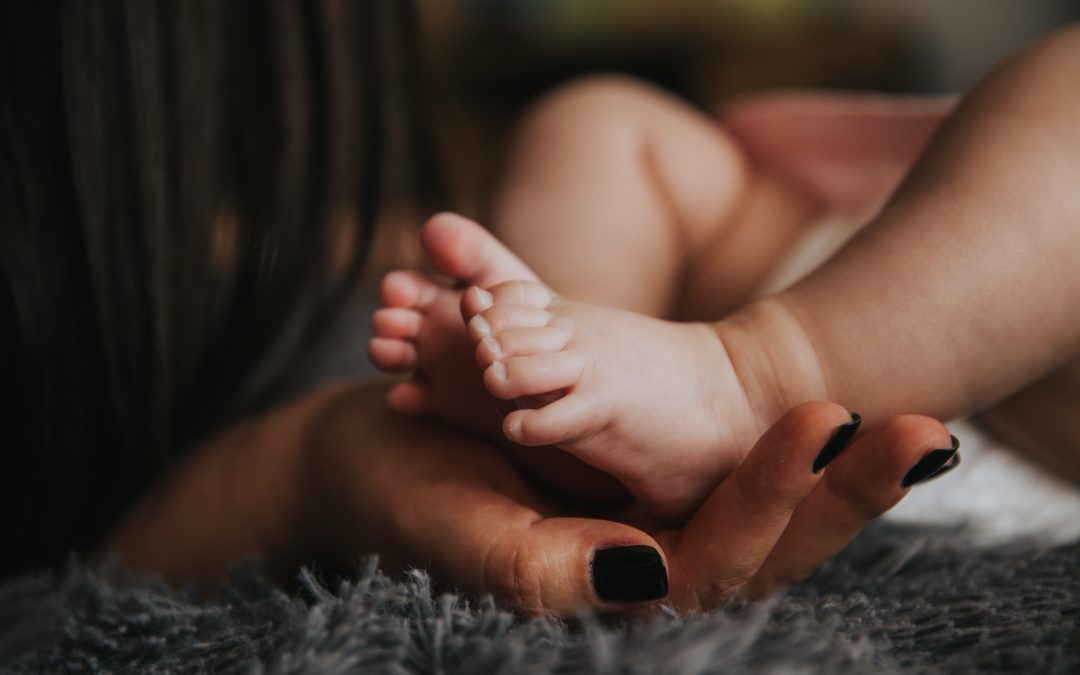What is the Difference Between Baby Blues and Postpartum Depression?
The biggest difference between the baby blues and postpartum depression is the severity and duration of symptoms. Symptoms of baby blues include mild ups and downs, weepiness, stress, and anxiety. Typically, these symptoms subside within 1-2 weeks. However, if symptoms last longer than a week, increase in severity, or interfere with the mother’s ability to function, she may be suffering from post-partum depression.
Both baby blues and postpartum depression are very common in mothers after giving birth. Baby blues affect 70-80% of postnatal mothers, while postpartum depression affects 1 in 7 moms.
Baby blues are often caused by a combination of sleep deprivation, the pain and strain of physical recovery, adjusting to life with the new baby, as well as a huge hormone shift as the pregnancy hormones estrogen and progesterone plummet. These factors and more wreak havoc on a mother’s body and emotions.
While baby blues symptoms are common, it’s still important to understand the difference between baby blues and postpartum depression (PPD) and to stay aware of a mother’s emotional state as PPD can become serious if left untreated.
What are the Baby Blues?
Baby blues are the mild mood swings, anxiety, and fatigue that often occur after childbirth. These symptoms typically include weepiness, irritability, and mild anxiety. The mental and physical symptoms of baby blues affect 70-80% of moms and typically manifest 1-2 days after giving birth. Baby blues can affect any new mother, even if she’s given birth before without any baby blues symptoms.
It is natural to feel out of sorts after giving birth. Not only are new mothers learning to cope with sleep deprivation, new responsibilities, and recovery, but they’re also undergoing a huge hormonal shift. After birth, estrogen and progesterone in the mother plummet, which can cause instability in emotions. Many mothers have described baby blues as feeling like “very bad PMS.”
Symptoms of Baby Blues may include:
- Mild ups and downs
- Weepiness
- Stress
- Anxiety
- Exhaustion
- Irritability
- Feelings of vulnerability
- Inability to concentrate
- Restlessness
- Change in appetite
Baby blues symptoms are typically mild and usually peak about 1 week following birth, then quickly subside. However, if the symptoms become more severe, do not diminish after a week or two, and are interfering with the mother’s ability to function, the mother may be suffering from Post-Partum Depression.
What is Postpartum Depression?
Postpartum depression is a mood disorder that affects 1 in 7 mothers after childbirth. This condition manifests in mood swings, restlessness, frequent crying, hopelessness, significant change in appetite, or anxiety. It differs from baby blues because the symptoms are typically more severe and do not subside after 1-2 weeks.
Postpartum depression can appear up to a year after the baby is born. Although postpartum depression is common, it is most easily resolved when it is addressed early by a mental health professional. Symptoms of postpartum depression may include any combination of the following:
Symptoms of postpartum depression:
- Mood swings
- Feeling overwhelmed
- Frequent crying
- Hopelessness
- Anger
- Anxiety
- Guilt
- Difficulty sleeping
- Decreased self-esteem
- Feelings of isolation
- Excessive worrying
- Rumination/obsession
- Loss of interest in usual activities
- Feelings of worthlessness
- Feeling incompetent or inadequate
- Lack of emotion
- Inability to form bond with baby
- Withdrawing from partner
- Suicidal or harmful thoughts
Postpartum depression can be treated by a mental health professional to help symptoms subside and to bring balance and joy back to the mother’s daily life. The mother may use any combination of individual therapy, group support, medication, and parenting partner coaching to overcome postpartum depression.
When to Get Help
If you suspect that you, your partner, or your family member may have postpartum depression, it’s important to get help as soon as possible. Symptoms can often worsen without help. If any of the following symptoms appear, you should seek help from a mental health professional immediately.
- Symptoms lasting more than 2 weeks
- Symptoms increasing in severity
- Thoughts of hurting self or baby
- Feelings of wanting to “give up”
- Limited ability to function
- Inability to bond with the baby
Receiving help for postpartum depression can help mothers improve emotional regulation, increase mindfulness and relaxation, create more meaningful attachment and bond with the baby, establish an emotional support network, improve family relationships, and more.
If you or someone you love is showing signs of postpartum depression, we encourage you to reach out as soon as possible: (801) 984-0184.


